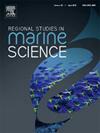The dynamic adjusted system of sea use fees: An empirical research on the sea use management in Zhejiang province
IF 2.1
4区 环境科学与生态学
Q3 ECOLOGY
引用次数: 0
Abstract
To prevent excessive exploitation of sea resources by developers, countries around the world have established systems for managing sea use. The system of sea use fees in China is continually improving, but it cannot reflect the full value of marine natural resources. Therefore, an optimization mechanism for dynamic adjustment which considered the value of marine natural resources and the adjustment coefficient of sea area fees was constructed in the study. This study explored the difference between marine resources zoning and the dynamic adjustment standard of sea use fees collection and took Zhejiang province as an example. The results showed that the comprehensive scores of coastal marine resources were generally higher than those of the open sea in Zhejiang province. Furthermore, the comprehensive scores of important ecological areas such as bays and islands were higher than those of other marine areas, and the comprehensive score of Ningbo sea area was significantly higher than those of other sea areas. On the basis, there are six classes of the adjustment range of the sea use fees standard were divided in Zhejiang province in the study. The overall increase of fee was 3.9–8.0 %. The results of study can assist decision-making by evaluating the value of marine resources and the adjustment of sea area usage royalties, which will help to improve the efficiency of sea area management.
动态调整的海域使用金制度:浙江省海域使用管理实证研究
为防止开发商过度开发海域资源,世界各国都建立了海域使用管理制度。我国的海域使用金制度在不断完善,但不能全面反映海洋自然资源的价值。因此,本研究构建了考虑海洋自然资源价值和海域使用金调整系数的动态调整优化机制。本研究以浙江省为例,探讨了海洋资源区划与海域使用金征收动态调整标准的差异。结果表明,浙江省近海海洋资源综合评分普遍高于公海。此外,海湾、海岛等重要生态区域综合得分高于其他海域,宁波海域综合得分明显高于其他海域。在此基础上,研究将浙江省海域使用金标准调整范围划分为六个等级。总体收费增幅为 3.9-8.0%。研究结果可为海洋资源价值评估和海域使用金调整提供辅助决策,有助于提高海域管理效率。
本文章由计算机程序翻译,如有差异,请以英文原文为准。
求助全文
约1分钟内获得全文
求助全文
来源期刊

Regional Studies in Marine Science
Agricultural and Biological Sciences-Ecology, Evolution, Behavior and Systematics
CiteScore
3.90
自引率
4.80%
发文量
336
审稿时长
69 days
期刊介绍:
REGIONAL STUDIES IN MARINE SCIENCE will publish scientifically sound papers on regional aspects of maritime and marine resources in estuaries, coastal zones, continental shelf, the seas and oceans.
 求助内容:
求助内容: 应助结果提醒方式:
应助结果提醒方式:


